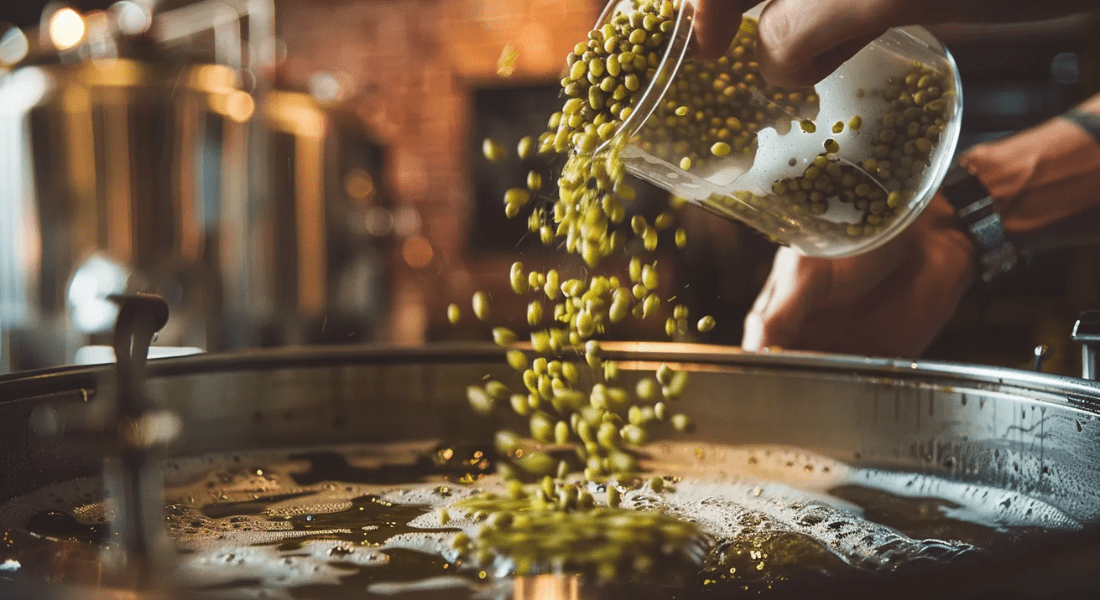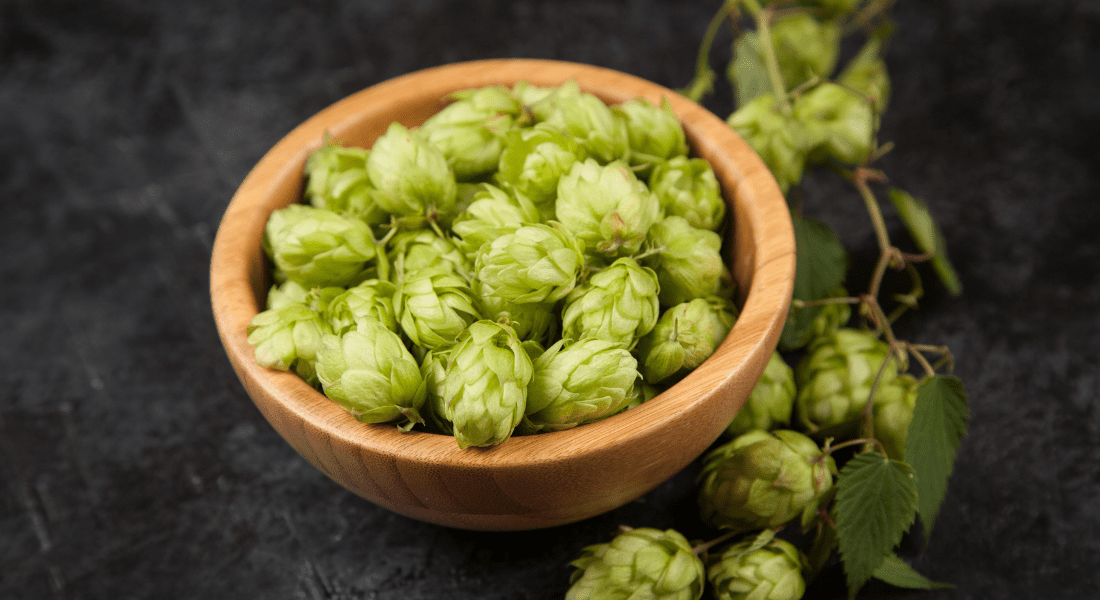Hops do more than just make your beer taste bitter. They’re also a natural way to help your brew last longer. But how does that work, and what’s the best way to use hops to keep your beer fresh? Let’s break it down into simple terms so you can make smarter brewing decisions.
What Are Hops, and Why Are They Essential to Beer?
Hops are the cone-shaped flowers of the Humulus lupulus plant. They act as a bittering agent to balance the sweetness of the malt and provide beer’s aroma and flavor.
Historically, brewers used herbs and spices like juniper to flavor beer, but hops emerged as a superior choice thanks to their unique properties.
Hops aren’t just about taste. They’re an essential ingredient in beer and have antimicrobial properties that prevent spoilage. This makes them invaluable for brewers aiming to produce a longer shelf life for their beers.
Before hops, ancient brewers used herbs and spices like juniper berries or gruit (a mix of herbs) to flavor beer. While these ingredients added flavor, they didn’t preserve the beer as well as hops do.
Hops became popular in brewing around the 9th century in Germany, where brewers noticed they not only added bitterness but also helped preserve the beer. By the 14th century, hops became the main ingredient in beer, replacing herbs and spices. Today, hops are essential for giving beer its unique taste and keeping it fresh.
How Do Hops Help Preserve the Beer?
Hops contain special compounds called alpha acids. When hops are boiled during brewing, these acids change into isomerized alpha acids, which are great at stopping the growth of bacteria, especially ones that cause spoilage.
This natural defense helps keep beer fresh for longer by making it harder for bad bacteria to grow. However, hops don’t protect against all types of bacteria. If bacteria are introduced during the brewing or packaging process, they can still spoil the beer. But in general, hops help keep the beer more stable and less likely to go bad.
This is one of the reasons why beers with more hops, like IPAs, were historically used for long journeys—hop-rich beers were less likely to spoil during transport. While modern brewing has other ways to preserve beer, hops continue to play an important role in keeping beer fresh and tasting great.

The Science Behind Hops’ Preservation
Two key compounds in hops—humulones and lupulones—are responsible for their antimicrobial power.
Humulones (also called alpha acids) are what make beer taste bitter. When hops are boiled during brewing, these acids change into iso-alpha acids, which not only add bitterness but also fight off bacteria that can spoil beer, especially a type called Gram-positive bacteria.
Lupulones, or beta acids, also help keep beer fresh. They don’t add bitterness like humulones, but they work together with alpha acids to stop harmful bacteria from growing. Even though lupulones aren’t as easy to dissolve, they still play an important role in making sure beer stays fresh for longer.
What’s great about hops is that their compounds target bacteria without affecting the yeast needed for fermentation. This means the brewing process works smoothly while the beer stays safe and tasty. Together, these compounds also help preserve the beer’s flavor and extend its shelf life.
When Should You Add Hops for Preservation?
If you want your beer to last longer, focus on adding hops early in the boil. This is when the alpha acids transform into their bacteria-fighting form. It’s also the best way to get that classic bitterness that balances the sweetness of the malt.
On the other hand, if you’re thinking about dry hopping (adding hops later in the brewing process), know that it’s more for boosting aroma and flavor. While dry hopping might add a tiny bit of extra preservation, it’s not nearly as effective as boiling hops for that purpose.
So, if your goal is a beer that stays fresh longer, make sure to focus on those early boil additions.
What Else Can You Do to Make Beer Last Longer?
To give your beer the best shot at staying fresh, here’s what you should do:
Keep Oxygen Away
Oxygen is bad news for beer. When beer mixes with oxygen, it can taste stale and lose its fresh flavors. To prevent this, brewers often fill bottles or tanks with carbon dioxide (CO₂) before adding the beer. This pushes out the oxygen. Using airtight packaging also helps keep air from sneaking in. The less oxygen, the fresher your beer stays.
Keep Everything Clean
Clean brewing equipment is a must! Even though hops help fight off bacteria, they can’t fix everything. If germs or wild yeast get into your beer, they can ruin it over time. That’s why brewers clean and sanitize every tool and tank they use. Clean gear means safer, longer-lasting beer.
Store Beer in the Right Spot
Beer lasts longer when it’s cold. A cool temperature, around 38°F (3°C), slows down any changes in flavor. Heat, on the other hand, speeds things up and can make your beer taste off. A fridge or another cold spot is the best place to store your beer to keep it tasting great.
Match Storage to the Beer Style
Different beers handle aging in different ways. Hoppy beers, like IPAs, taste best when they’re fresh because their bright flavors fade quickly. But stronger beers, like stouts or barleywines, can improve with time. Their rich, malty flavors mellow out, making them even better as they age. Knowing the style of beer will help you decide how long to store it.
Different Types of Hops Used in Brewing
Hops play different roles depending on when and how they’re added to the brewing process:
Bittering Hops
Bittering hops are added early in the brewing process, usually during the boil. They help balance the sweetness of the malt by adding bitterness, which comes from alpha acids released when the hops are boiled. Without them, beer would taste overly sweet. Cascade is a great example of a bittering hop. Its strong bitterness makes it perfect for pale ales and IPAs. Magnum is another example, offering a smooth, clean bitterness often used in lagers and stouts.
Aroma Hops
Aroma hops are added later in the brewing process, either at the end of the boil or during dry hopping. These hops don’t contribute much bitterness but instead enhance the beer’s smell and flavor with notes like citrus, flowers, or pine. For instance, Citra is a popular aroma hop that adds tropical fruit and citrus flavors, making it ideal for pale ales and IPAs. Saaz, on the other hand, is known for its herbal and spicy aroma, often used in pilsners and lagers.
If you’re looking to buy Citra hops, Hop Head Farms is the perfect choice! We offer high-quality Citra hops at an affordable price of $12.75 per pound. These hops are from the 2023 crop year, and we currently have 11 pounds available.
Dual-Purpose Hops
Dual-purpose hops are versatile because they can be used for both bittering and aroma in brewing. These hops have a high enough alpha acid content to add bitterness early in the process, while also offering rich, complex flavors and aromas when added later. A great example is Mosaic hops, which provide balanced bitterness along with fruity and earthy notes like mango, citrus, and pine. Brewers love dual-purpose hops because they simplify recipes while delivering a wide range of flavors, making them perfect for styles like IPAs and pale ales.
Buy Hops Directly At Hop Head Farms!
At Hop Head Farms, we take pride in delivering the finest hops straight from our fields in Southwest Michigan to your brewery. Our hops are expertly grown and carefully processed to ensure consistent quality, bold flavors, and vibrant aromas in every batch.
With a wide variety of hop options, we make it easy for craft brewers to create beers that stand out with every pour. Whether you’re brewing a crisp lager or a hop-forward IPA, our premium hops are your key to crafting unforgettable beer. Buy your hop pellets today!
Key Takeaways
- Hops are essential: They contribute to the flavor, aroma, and preservation of beer.
- Preservation is key: Hops’ antimicrobial properties help to stabilize and preserve the beer.
- Alpha acids matter: They define bitterness and play a crucial role in beer brewing.
- Timing impacts flavor: Hops added early create bitterness; added later, they enhance aroma and flavor.
- Experimentation is endless: Different hop varieties and brewing techniques create diverse beer styles.
FAQs
Q. What makes hops a preservative?
A. Hops help keep beer fresh because they contain natural chemicals that fight off bacteria and other things that can spoil beer. These chemicals, called alpha acids, act like a shield, making beer last longer.
Q. Do hops stabilize beer?
A. Yes, hops help beer stay consistent over time. They add a bitterness that balances the sweet malt flavors, which keeps the beer tasting good longer. But storing beer properly and brewing it well is just as important for keeping it stable.
Q. What is beer without hops called?
A. Beer made without hops is called gruit or unhopped ale. Instead of hops, brewers use herbs and spices like yarrow or juniper to add flavor. This was how beer was made before hops became the go-to ingredient.
Q. Do hops make beer more alcoholic?
A. No, hops don’t make beer stronger. Alcohol comes from the sugar in the malt, which yeast turns into alcohol during brewing. Hops just add flavor and bitterness, and also helps preserve the beer. Some hoppy beers, like Double IPAs, are stronger, but that’s because they use more malt, not more hops.


